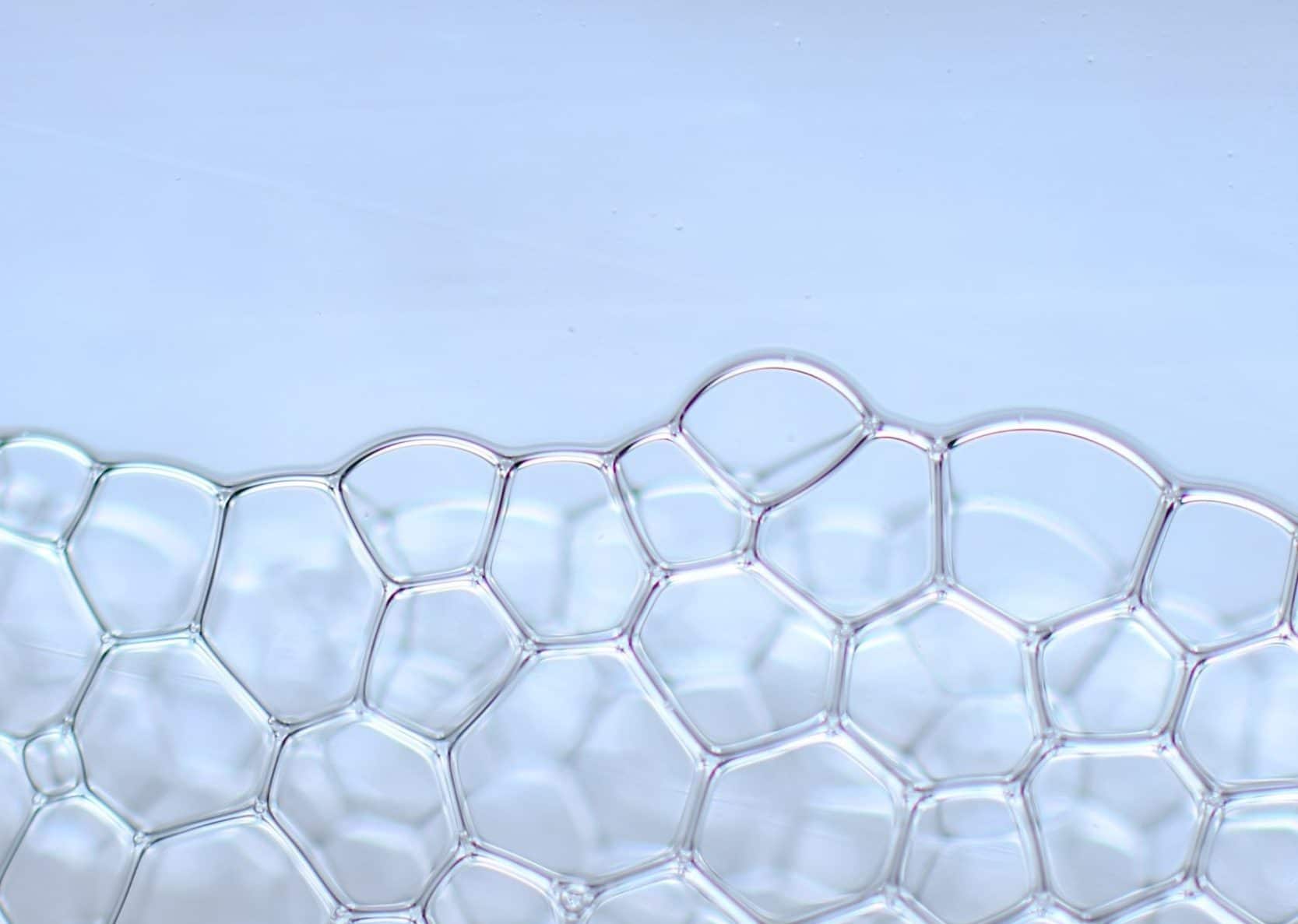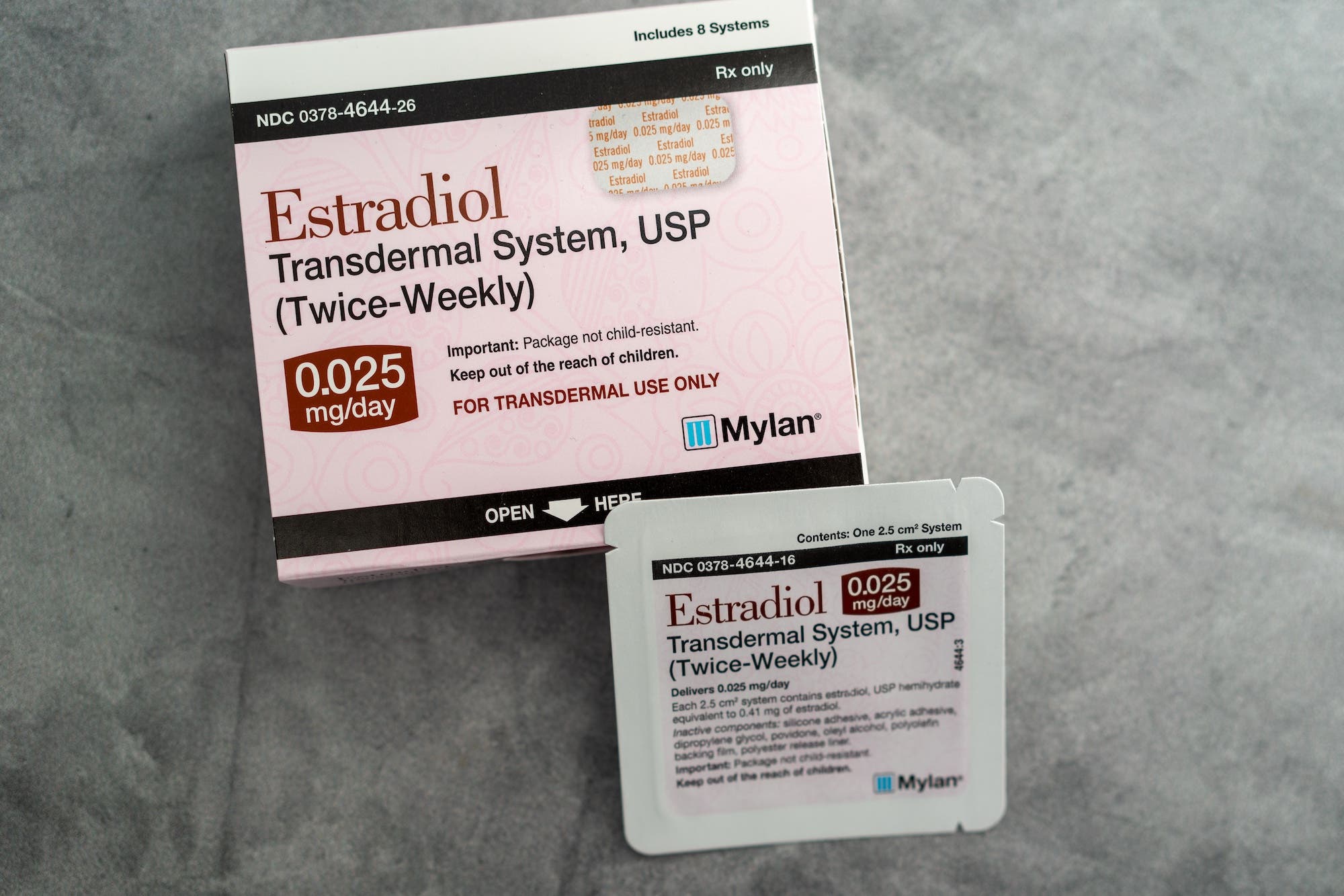Antisperm antibodies, or ASA, are immune system proteins that destroy sperm. They can be produced when the body mistakes sperm for an invader and triggers the immune system to protect itself. Though rare, antisperm antibodies can be found in semen, blood, or vaginal fluids.
The presence of antisperm antibodies can have a negative effect on fertility by impacting sperm count, motility, and sperm-egg interaction. Find out what causes antisperm antibodies, how to test for these destructive proteins, and treatment options that are available.
Key takeaways:
- Antisperm antibodies are immune system proteins that mistakenly attack sperm as if they were foreign invaders.
- There are several possible causes for ASA, which can be found in both male and female bodies.
- Antisperm antibodies negatively affect fertility by severely impacting sperm count and motility and impeding the fertilization process.
- After testing positive for antisperm antibodies, doctors may treat antisperm antibodies with immunosuppressive therapies or laboratory techniques like sperm washing. Alternatively, fertility treatments like IUI, IVF, or ISCI can assist in fertility.
What are antisperm antibodies?
Antibodies are proteins that the immune system produces in response to foreign material in the body, such as bacteria and viruses. When the body mistakenly views sperm as foreign material, it produces antisperm antibodies to destroy it. When a high number of antisperm antibodies come into contact with sperm, it can be difficult for that sperm to fertilize an egg, resulting in a condition called “immunologic infertility.”
What causes antisperm antibodies?
Antisperm antibodies can be found in the semen, blood, or vaginal fluids.
In males
Injury or surgery
When the testicles are injured or a surgery is performed, the blood-testis barrier may be breached, resulting in sperm coming into contact with the immune system and triggering an inflammatory response. This response initiates the formation of antisperm antibodies.
Vasectomies are one of the most common causes, with one study indicating that 50% of vasectomized men had been found to have antisperm antibodies following vasectomy. Vasectomy reversal surgery, or vasovasostomies, do not always reduce the incidence of antisperm antibodies. A 2013 study found that significant levels of antisperm antibodies were seen in 53% of vasectomy reversal patients and were not predictable based on age, obstructive interval, or surgical method. Other surgeries, like testicular biopsies, have also been associated with antisperm antibodies.
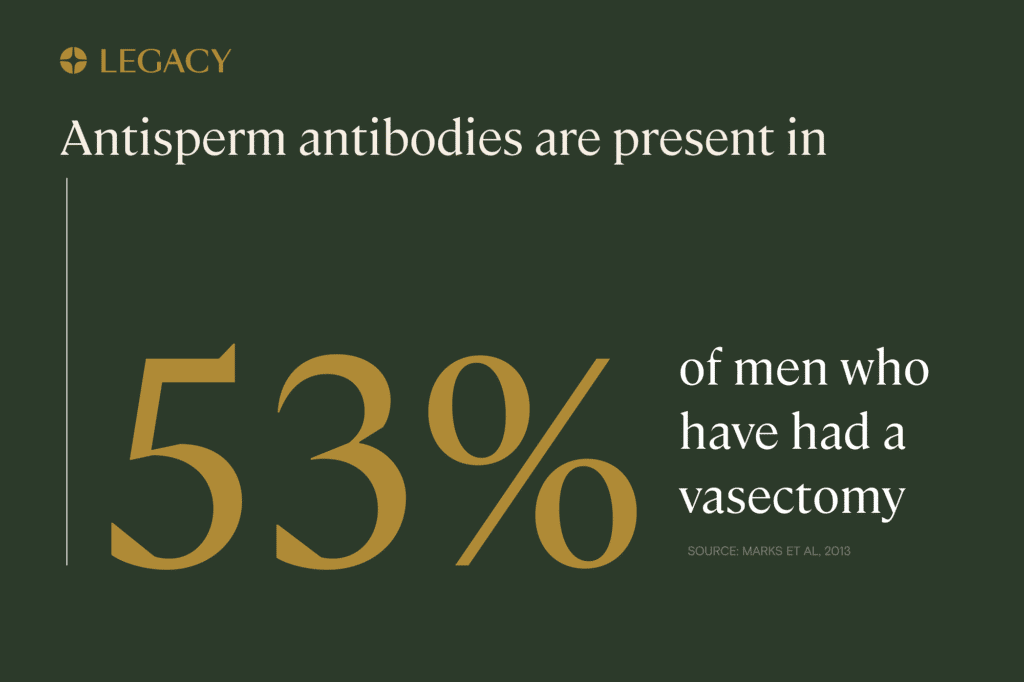
Trauma such as testicular torsion can also lead to the formation of antisperm antibodies. A 2019 study found that even after testicular torsion surgery corrected the issue, antisperm antibodies could still sometimes be detected in the semen.
Infection
Prostate infections such as chronic prostatitis (inflammation) may cause antisperm antibodies, as shown in a 2016 study. Prostatitis triggers an inflammatory response in the body, which results in an imbalance of pro- and anti-oxidative factors within male semen, leading to the formation of the destructive protein.
Obstruction
Lastly, a Japanese study found that males with obstructions in the vas deferens, the tube that brings sperm from the testes to the penis, related to a childhood hernia may also have antisperm antibodies. The study showed that those who had this type of obstruction had as high an incidence of antisperm antibodies as vasectomized patients.
In females
Antisperm antibodies can be produced in the female reproductive system when the body has an “allergic reaction” to sperm. The reasons for this immune response are not fully understood.
One study of 45 infertile women in Iraq found that antisperm antibodies were found in the cervicovaginal secretions of 62.2% women. Researchers suggested this was due to a “mechanical or chemical disruption of the mucosal layer of the female genital tract,” which exposed the immune system to sperm, ultimately leading to the production of antisperm antibodies.
Infections may increase the risk for antisperm antibodies in females. One study showed that 46% of women diagnosed with upper genital tract infection (pelvic inflammatory disease) tested positive for antisperm antibodies. This was compared to antisperm antibodies found in 20% of women with lower genital tract infections, such as fungal, chlamydia, or bacterial vaginosis.
Finally, antisperm antibodies were detected in 69% of women with laparoscopically confirmed pelvic adhesive disease, a condition in which scar tissue binds adjacent organs to one another — sometimes a complication of pelvic inflammatory disease or endometriosis.
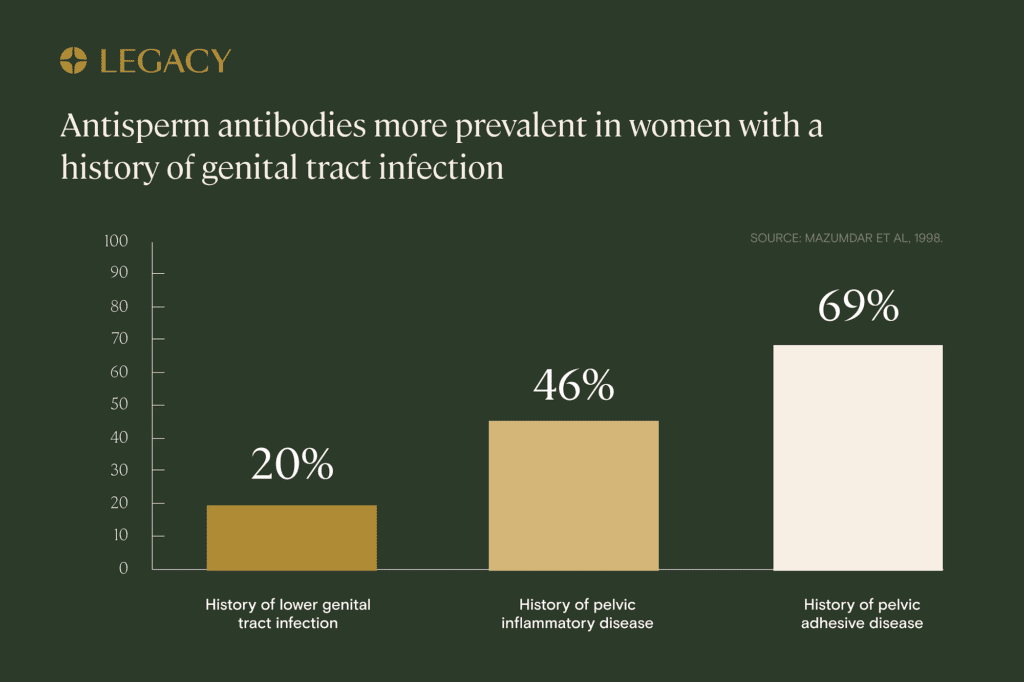
How does the presence of antisperm antibodies affect fertility?
A 1993 study found that antisperm antibodies contributed to up to a third of infertility cases.
When antisperm antibodies are produced in males, they can severely impact sperm quality , including sperm count and sperm motility. This makes it challenging for the sperm to pass through cervical mucus to reach the egg. In one study of 100 patients with male-factor infertility , 18% of these patients had antisperm antibodies in their seminal fluid.
When antisperm antibodies occur in females, they have the ability to destroy sperm before they are able to reach the egg, hindering the fertilization process. One study showed that antisperm antibodies may also form in uterine tissue, which triggers the secretion of histamine and induces the expulsion of an implanted embryo.
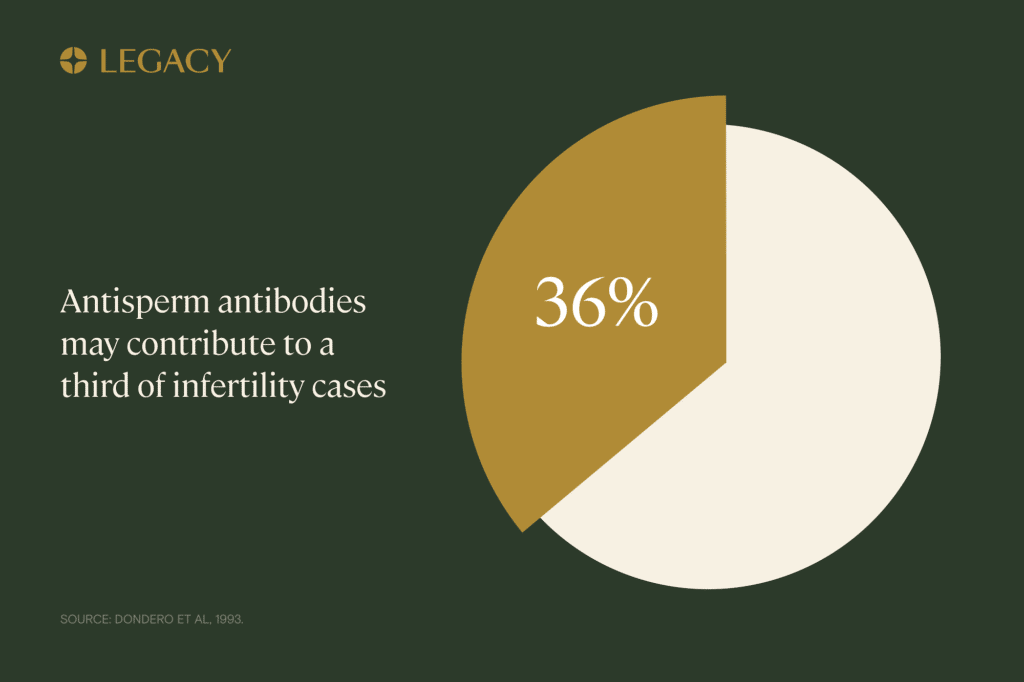
Testing for antisperm antibodies
There are no obvious symptoms of antisperm antibodies beyond infertility, defined as the inability to get or stay pregnant after 12 months of trying to conceive. Only an antisperm antibodies test will be able to confirm the presence of this protein in the body.
There are two types of this test available: direct and indirect. In a direct test, a sample of sperm is collected via masturbation. Doctors then add a substance to the collection that binds only to affected sperm. Indirect testing entails checking other bodily fluids, such as blood serum, for the presence of antisperm antibodies.
Treatment for antisperm antibodies
Immunosuppressive therapies like corticosteroids and cyclosporine may help treat antisperm antibodies, though research is very limited. In one study of nine infertile men, immunosuppressive therapy reduced antisperm antibodies in three subjects and substantially increased sperm count and fertility in one. A total of three successful pregnancies occurred.
Fertility treatment to conceive despite ASA
Laboratory techniques such as sperm washing can also be used to reduce the impact of antisperm antibodies on fertility. During sperm washing, semen is placed in a centrifuge and spun to separate sperm from seminal fluid and attached antibodies. In one study , sperm washing reduced the percentage of sperm affected by antisperm antibodies by 35–45%.
Fertility treatments such as intrauterine insemination (IUI) and in vitro fertilization (IVF) can help facilitate the fertilization process if antisperm antibodies are present. In these cases, the collected sperm will be first treated with a buffer solution or washed before implantation.
If IUI or IVF is not successful, doctors may suggest intracytoplasmic sperm injection (ISCI), in which a single sperm is injected directly into an egg to create a fertilized embryo. A 2019 study found that success rates were higher in couples affected by antisperm antibodies when they paired IVF with ICSI.
The bottom line: Antisperm antibodies may negatively affect fertility, but there are a variety of treatments that can help.
If you are having trouble conceiving, consider taking an antisperm antibody test to see if this protein is the cause. You may also want to test your sperm for volume, count, concentration, motility, and morphology to get a full picture of your fertility. Knowing how healthy your sperm is today can help you make informed decisions to improve your sperm quality and protect fertility chances for years to come.
